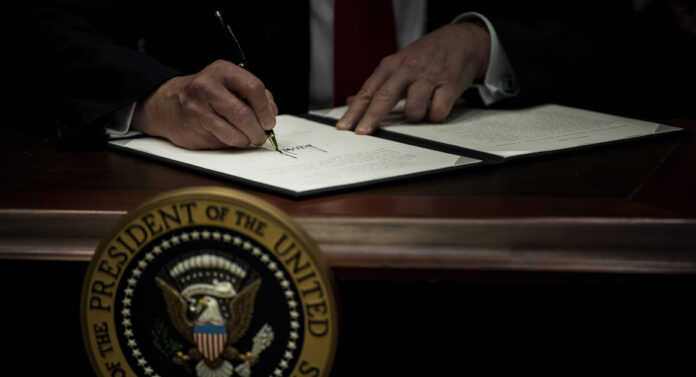Legal and Insurance Insights:
- Legal Gold Rush: Lawyers brace for a surge in immigration and compliance cases, potentially filling their coffers with new revenue streams.
- Insurance Windfall: New risks mean new policies, as insurers adjust to a shifting regulatory landscape under Trump’s America First agenda.
- Client & Policyholder Vigilance: Essential steps to avoid being exploited in an era of legal and insurance market turbulence.
By Samuel A. Lopez – USA Herald
[LOS ANGELES, CA] 4:43 PM PST – In a strategic maneuver, President Donald Trump’s recent executive orders are set to revolutionize the legal and insurance industries, unlocking substantial revenue streams and fostering unprecedented growth.
These directives, aimed at deregulation, enhanced immigration enforcement, and healthcare reforms, are creating a fertile environment for law firms, lawyers, insurance companies, agents, and policyholders to capitalize on the shifting landscape. However, as these sectors flourish, it is imperative for clients and policyholders to remain vigilant against the potential for artificially inflated hourly rates or other price gouging tactics to ensure they receive fair treatment amidst the increased demand.
President Trump’s executive orders have significantly altered the regulatory framework, presenting both challenges and opportunities for the legal industry. Law firms of all sizes are poised to benefit from the heightened demand for specialized legal services.
With stricter immigration enforcement, there is a surge in the need for immigration attorneys who specialize in deportation defense, asylum cases, and visa applications. This increased demand is not limited to immigration law alone; businesses are also seeking legal expertise to navigate new trade regulations and tariffs, thereby boosting the need for corporate compliance services.
Furthermore, the alterations in healthcare regulations necessitate legal professionals to assist organizations in adapting to new insurance coverage mandates. Constitutional law experts and civil rights attorneys are expected to see a rise in cases challenging the executive orders, providing ample opportunities for litigation and advocacy. Lawyers specializing in international trade and corporate restructuring will find themselves in high demand as businesses adjust to the new trade policies and tariffs.
Paralegals and legal analysts are also set to experience an uptick in workload. The evolving legal landscape requires extensive research, documentation, and case preparation, elevating the role of paralegals in supporting complex legal cases.
Legal analysts, on the other hand, are crucial for interpreting the implications of the new orders, offering strategic insights to businesses and law firms alike.
The insurance industry is equally positioned to reap the benefits of Trump’s executive orders. Insurance companies, both large and small, are revising their policies to comply with new healthcare regulations and developing innovative insurance products to cover emerging risks. Enhanced immigration and trade policies necessitate advanced risk management strategies, allowing insurance firms to offer comprehensive solutions tailored to the new regulatory environment.
Individual insurance agents and underwriters play a pivotal role in this transformation. Agents are guiding clients through the complexities of new insurance requirements, while underwriters are recalibrating risk assessments to align with updated regulations. Policyholders are encouraged to reassess their insurance coverage to ensure it meets the new standards, anticipating potential premium adjustments based on the evolving risk landscape. Insurers may introduce discounts for policyholders who take proactive measures to mitigate risks, further enhancing customer value.
As the legal and insurance sectors expand, there is an inherent risk of price gouging driven by the increased demand for services. Clients and policyholders must adopt proactive measures to safeguard their interests. For those represented by lawyers or law firms, transparency in communication is crucial. Understanding fee structures, setting clear expectations, and asking questions can help prevent unexpected charges and ensure fair pricing. Additionally, leveraging pro bono services and staying informed through trusted sources like the USA Herald can empower clients to negotiate effectively.
Insurance policyholders must also take proactive steps to protect themselves. Regular policy reviews are essential to assess coverage needs and update information to avoid unnecessary premium hikes. Comparing quotes from multiple insurers ensures competitive pricing and comprehensive coverage, while evaluating available discounts can also lead to significant savings. Staying educated about new insurance laws and regulations enables policyholders to make informed decisions and seek expert advice when necessary.
President Trump’s agenda for “Making America Great Again” includes several key changes to insurance laws and regulations that will directly impact policyholders across the United States. Notable among these are modifications to the Affordable Care Act (ACA), affecting coverage options and insurance mandates. Enhanced immigration enforcement is expected to lead to changes in employment-based insurance requirements, while adjustments in trade policies could influence business interruption and liability insurance products. These confirmed changes necessitate vigilance and adaptability from policyholders to navigate the evolving regulatory landscape effectively.
For clients of lawyers or law firms, conducting due diligence is paramount. Researching and verifying the credentials and reputation of legal representatives ensures trustworthy representation. Requesting detailed agreements and monitoring the progress of legal cases help maintain transparency and accountability. Similarly, insurance policyholders should document all communications with their providers, report suspected overcharges to regulatory bodies, and continuously educate themselves on their rights and policy specifics.
As the legal and insurance sectors adapt to President Trump’s executive orders, maintaining ethical standards remains paramount. Professionals in these industries must balance business opportunities with their duty to uphold justice and provide protection to those in need. By approaching these changes with integrity and a commitment to fair practices, the legal and insurance sectors can thrive while contributing positively to society.



